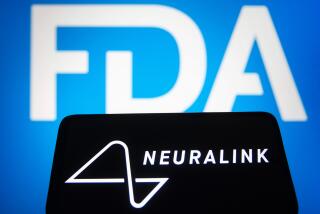FDA Is Closer to Approving Cosmetic Silicone Implants
- Share via
WASHINGTON — Silicone implants for cosmetic breast enhancement moved a step closer to approval Thursday as federal regulators laid out conditions for a manufacturer to begin marketing them.
“It means the product can be approved once certain remaining issues are finalized,” said Donna-Bea Tillman, director of the U.S. Food and Drug Administration’s Office of Device Evaluation.
The FDA said it spelled out the conditions in a letter to Mentor Corp., one of two Santa Barbara companies seeking approval to market implants. The letter and conditions, considered confidential business information, were not released.
Silicone gel implants are regarded as having a more natural look and feel than saline-filled ones, but concerns remain about ill effects should they rupture or leak. They are now available only to women undergoing breast reconstruction, having been ordered off the market for cosmetic use in 1992 over concerns about health problems possibly caused by ruptured or leaking implants.
Studies have found no link between silicone breast implants and cancer or other life-threatening illnesses, but many women have experienced complications related to surgery, including painful contracture of the breasts. Some experts are concerned that leaking silicone could prompt chronic fatigue symptoms.
The FDA action came the same day that nine of the Senate’s 14 women, including California Democrats Dianne Feinstein and Barbara Boxer, wrote FDA Commissioner Lester M. Crawford about their concerns.
Others urging Crawford to “protect the health and well-being of American women” were Democrats Hillary Rodham Clinton of New York, Mary L. Landrieu of Louisiana, Debbie Stabenow of Michigan, Blanche Lincoln of Arkansas and Barbara A. Mikulski of Maryland, as well as Republicans Olympia J. Snowe of Maine and Kay Bailey Hutchison of Texas.
“Silicone implants, while providing a prosthetic with more natural characteristics, bear greater risks than saline implants,” the senators noted. “Such implants can interfere with mammography. In addition, when failure occurs ... this usually occurs without symptoms and is detected only via magnetic resonance imaging (MRI) -- and even MRI does not detect some ruptures.”
About 250,000 women have cosmetic breast surgery each year.
Separately, the Senate Health, Education, Labor and Pensions Committee is investigating health questions surrounding the implants and the FDA’s review process, a spokesman said.
Mentor said the FDA letter was a significant step forward.
“We are very encouraged by this communication from the FDA, and view this letter as a positive sign for women and their surgeons that another option will soon be available,” Chief Executive Joshua H. Levine said in a statement.
In April, an FDA advisory panel urged conditional approval of Mentor’s implants. The 7-2 vote came with nine recommendations, including ongoing safety studies, mandatory follow-up care for patients, special training for surgeons and voluntary tracking of every woman with implants.
Mentor said in a statement that the conditions in Thursday’s letter were “generally consistent” with the panel’s recommendations. “Mentor intends to engage in confidential discussions with the FDA to address these conditions,” it said.
Neither the agency nor the company would say how long it might be before a final decision is reached.
It was unclear how the FDA’s move would affect Mentor’s competitor, Inamed Corp.
The advisory panel had opposed Inamed’s application, then surprised observers by backing Mentor’s. Yet the FDA’s staff had raised similar concerns about both products.






